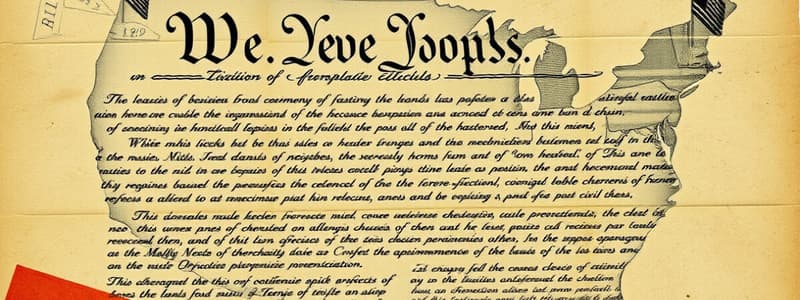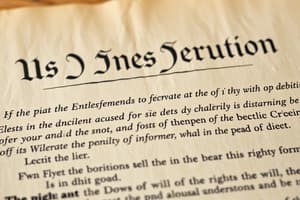Podcast
Questions and Answers
What does the 1st Amendment protect?
What does the 1st Amendment protect?
- Gun ownership
- Free speech and religion (correct)
- Unreasonable searches
- Housing soldiers
What does the 2nd Amendment state?
What does the 2nd Amendment state?
- No double jeopardy
- Right to gun ownership (correct)
- Right to free speech
- No unreasonable searches
What does the 3rd Amendment protect?
What does the 3rd Amendment protect?
Prevents the government from forcing people to house and feed soldiers in times of peace.
What is the focus of the 4th Amendment?
What is the focus of the 4th Amendment?
What are the protections included in the 5th Amendment?
What are the protections included in the 5th Amendment?
What six protections are guaranteed by the 6th Amendment during trials?
What six protections are guaranteed by the 6th Amendment during trials?
What does the 7th Amendment allow?
What does the 7th Amendment allow?
What does the 8th Amendment prohibit?
What does the 8th Amendment prohibit?
What is stated in the 9th Amendment?
What is stated in the 9th Amendment?
What does the 10th Amendment state?
What does the 10th Amendment state?
What is the 11th Amendment about?
What is the 11th Amendment about?
What is the purpose of the 12th Amendment?
What is the purpose of the 12th Amendment?
What does the 13th Amendment achieve?
What does the 13th Amendment achieve?
What does the 14th Amendment guarantee?
What does the 14th Amendment guarantee?
What significant right is granted by the 15th Amendment?
What significant right is granted by the 15th Amendment?
What does the 16th Amendment allow?
What does the 16th Amendment allow?
What change does the 17th Amendment bring about?
What change does the 17th Amendment bring about?
What does the 18th Amendment establish?
What does the 18th Amendment establish?
What is the focus of the 19th Amendment?
What is the focus of the 19th Amendment?
What procedural change does the 20th Amendment introduce?
What procedural change does the 20th Amendment introduce?
What change is made by the 21st Amendment?
What change is made by the 21st Amendment?
What does the 22nd Amendment limit?
What does the 22nd Amendment limit?
What does the 23rd Amendment grant?
What does the 23rd Amendment grant?
What is prohibited by the 24th Amendment?
What is prohibited by the 24th Amendment?
What does the 25th Amendment address?
What does the 25th Amendment address?
What does the 26th Amendment establish?
What does the 26th Amendment establish?
What is a focus of the 27th Amendment?
What is a focus of the 27th Amendment?
Flashcards are hidden until you start studying
Study Notes
First Ten Amendments (Bill of Rights)
- 1st Amendment: Guarantees freedom of speech, religion, press, assembly, and petition without government interference.
- 2nd Amendment: Protects the right of individuals to keep and bear arms.
- 3rd Amendment: Prohibits the quartering of soldiers in private homes during peacetime without consent.
- 4th Amendment: Protects against unreasonable searches and seizures; warrants must be judicially sanctioned.
- 5th Amendment: Establishes rights of the accused including: grand juries, protection against double jeopardy, self-incrimination, due process, and just compensation for taken property.
- 6th Amendment: Ensures six rights related to criminal prosecutions: speedy and public trial, knowledge of accusation, confrontation of witnesses, impartial jury, legal counsel, and compulsory process for obtaining witnesses.
- 7th Amendment: Grants the right to a jury trial in civil cases involving more than twenty dollars.
- 8th Amendment: Prohibits excessive bail, excessive fines, and cruel or unusual punishments.
- 9th Amendment: Asserts that the enumeration of certain rights in the Constitution does not deny or disparage other rights retained by the people.
- 10th Amendment: Reserves powers not delegated to the national government nor prohibited to the states for the states and the people.
Next Amendments (11th to 27th)
- 11th Amendment: Limits the ability of individuals to sue states in federal court.
- 12th Amendment: Reformed the presidential election process, allowing for separate electoral votes for President and Vice President.
- 13th Amendment: Abolished slavery and involuntary servitude, except as punishment for a crime.
- 14th Amendment: Defines citizenship, prohibits states from denying equal protection under the law, and ensures due process.
- 15th Amendment: Prohibits the federal and state governments from denying a citizen's right to vote based on race, color, or previous condition of servitude.
- 16th Amendment: Allows Congress to levy an income tax without apportioning it among the states.
- 17th Amendment: Establishes the direct election of U.S. Senators by popular vote.
- 18th Amendment: Prohibited the manufacture, sale, and transportation of alcohol (Prohibition).
- 19th Amendment: Granted women the right to vote.
- 20th Amendment: Changed the dates for the start of presidential and congressional terms (Lame Duck Amendment).
- 21st Amendment: Repealed Prohibition, reversing the 18th Amendment.
- 22nd Amendment: Limits Presidents to two terms in office.
- 23rd Amendment: Grants Washington D.C. electors in the Electoral College.
- 24th Amendment: Prohibits poll taxes in federal elections.
- 25th Amendment: Addresses presidential succession and disability.
- 26th Amendment: Lowers the voting age to 18 years.
- 27th Amendment: Delays laws affecting Congressional salary from taking effect until after the next election.
Studying That Suits You
Use AI to generate personalized quizzes and flashcards to suit your learning preferences.




